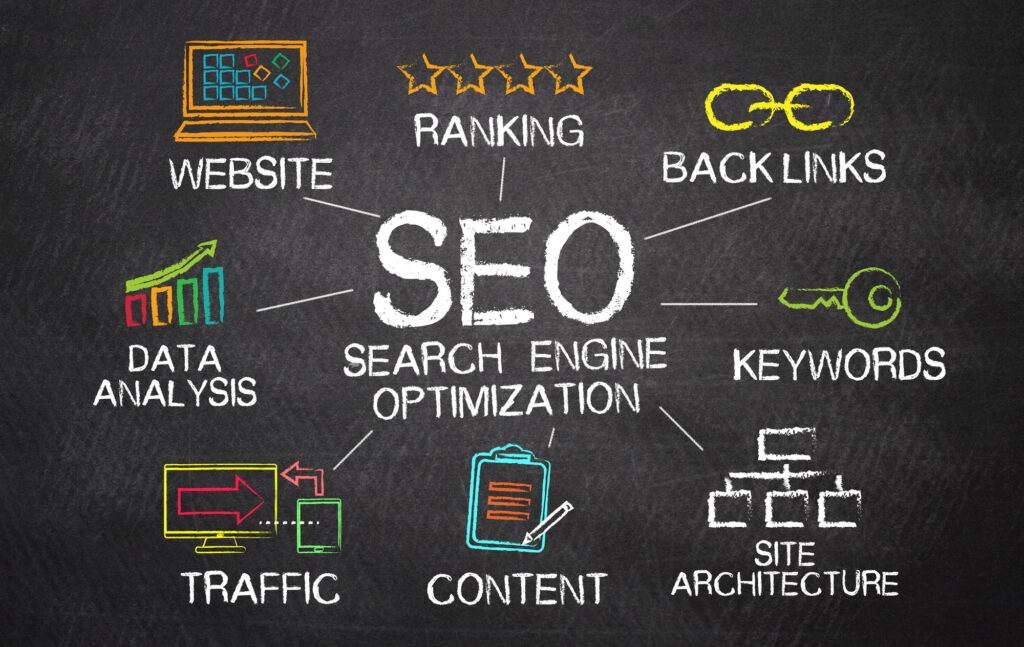An Essential Guide To E-commerce SEO
Building an e-commerce website is the way forward if you want to run a successful business, as it allows you to connect with a wide online audience. Additionally, an e-commerce website removes the restrictions of geographical borders you’d normally face with a brick-and-mortar store. Therefore, a website allows you to serve clients worldwide, potentially leading to an increase in sales over time.
While a website is an integral part of running your e-commerce, optimizing it for search engines is necessary. Most business searches happen over the internet, making your brand’s visibility critical for attracting customers. Without an effective search engine optimization (SEO) strategy, customers may struggle to find and connect with your business.
An Overview Of E-Commerce SEO
E-commerce SEO is a process of improving your website’s performance to rank high in the search engine result pages. It’s a practice of enhancing your brand’s online presence so that people searching for products or services related to your business can locate you.
Leveraging e-commerce SEO can drive more traffic to your website, generate more qualified leads and make more sales. In essence, an SEO marketing strategy is the backbone for the growth of any e-commerce store.
However, creating and implementing an effective SEO strategy can be complex and time-consuming. This is where professional help can be invaluable.
The Role Of E-Commerce Agencies In SEO

Hiring an e-commerce agency is one of the effective ways to establish a robust SEO strategy. To succeed in brand awareness and online visibility, working with experts who understand the ins and outs of SEO is vital. They’ll guide you in identifying and implementing the best SEO strategies for your business. Agencies that specialize in e-commerce SEO, such as Boldist, can offer valuable insights and strategies to help manage your SEO efforts.
How To Improve Your E-Commerce SEO
Improving your website’s SEO involves several strategies:
- Research The Right Keywords
Keywords are one of the most important elements of e-commerce SEO. When searching for information online, consumers utilize certain keywords to retrieve specific content or topics. The right keywords are the phrases most searched for by consumers in your niche. Therefore, researching for the right keywords is vital to help you connect with more target customers.
Online keyword research tools can help identify all the keywords related to your niche. They also provide search keyword volume data, which can be useful in selecting the right keywords for your content.
Additionally, visiting your competitor’s websites to see what keywords they’ve used in their content can provide valuable insights. Given that your customer base overlaps, incorporating similar keyword concepts from their digital content can be a beneficial strategy.
- Publish Relevant Quality Content
Once you research the right keywords, it’s time to create content around those keywords. The primary reason why customers would want to visit your website is to find solutions to their problems. So, your content must address the consumers’ concerns and be relevant to your target audience.
It’s just not enough to publish relevant content. It should also be high quality. Quality content created specifically for your target customers helps generate website traffic, improving your online ranking. Besides, quality is one of the important elements search engine tools consider when ranking a website. Therefore, publishing high-quality content improves your SEO and brand visibility. Improve your writing skills and always post authoritative content for your target clients.
- Increase The Speed Of Your Website
No matter how relevant and quality the content might be, no one will consume it if your website is too slow. It’s no secret that customers are impatient; no one will be willing to wait too long for your website to display the information they want. If your website is too slow, you risk losing potential customers to your competitors.
A faster website enhances user experience. Visitors are likely to stay longer on your online store, which improves your visibility. If you realize that your website is slow, here are a few steps you can take to make things better:
- Enable Caching: This reduces the load on your server and helps your web pages load faster.
- Use A Content Delivery Network: It stores copies of your website on these servers and serves your website to users from the server that’s closest to them, which can significantly improve load times.
- Move The Website To A Better Hosting Solution: If your current host isn’t delivering the speed you need, it might be time to consider upgrading to a more robust hosting solution.
- Compress Your Images: This reduces the file size without significantly impacting their quality, leading to faster load times.
- Reduce The Number Of Redirects: Each redirect triggers an additional HTTP request-response cycle, delaying the rendering of the page. Minimizing the number of redirects can improve your site’s load time.
Improving your website’s speed is not just about enhancing the user experience. It’s also a crucial aspect of SEO. Therefore, it’s worth investing time and resources into making your website as fast as possible.
- Get Backlinks
Backlinking is an integral part of e-commerce SEO. It’s a process of link building or generating links for other websites, allowing your content users to find more information related to your content.
Link building improves your e-commerce SEO in many ways. For example, it can generate more organic traffic from the websites you’ve linked to. That improves your visibility and online ranking. With the increased traffic on your website, you stand a higher chance of generating more leads and increasing sales.
Takeaway
Establishing an e-commerce SEO is one of the practical ways to ensure your business continues to thrive. It helps to amplify your brand’s reach on the internet and be found by intended customers. However, you must do it in the right way. Each aspect of your SEO strategy plays a crucial role in its overall effectiveness. Researching keywords, publishing quality content, increasing the web load time, and getting backlinks are effective strategies for an e-commerce SEO.

